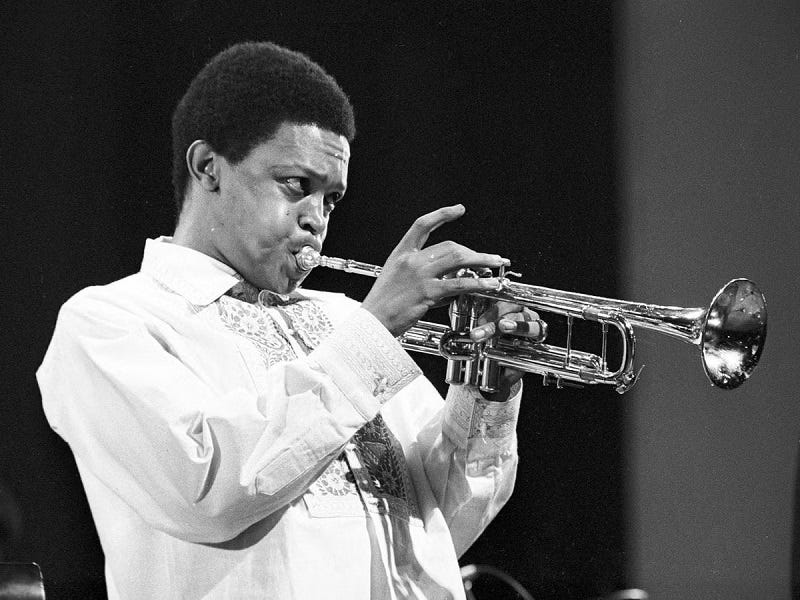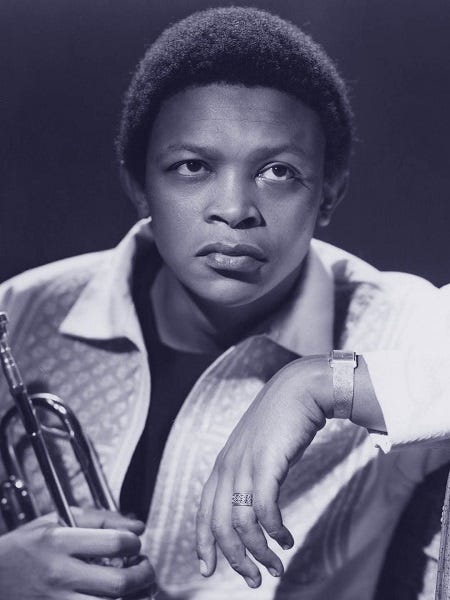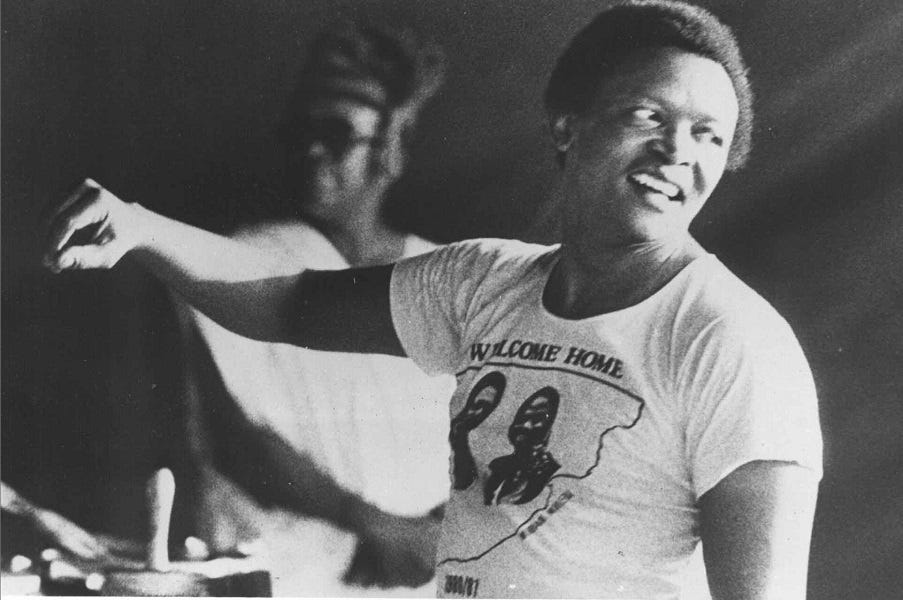Hugh Masekela (April 4, 1939 – January 23, 2018) – The Boy's Doin' It (1975)
This jazz-funk bomb was the title track to the legendary South African trumpeter's first album for Casablanca, recorded with his mid-70s backing band Ojah.
View most updated version of this post on Substack
Search our full archives
The legendary musician Hugh Masekela was a South African multi-instrumentalist who mainly played trumpet. He went into exile in the United States during the 1960s where he helped popularize African music and the anti-apartheid movement through the many albums he released on major record labels and his own label Chisa Records.
In November, 1965, Masekela performed live at The Village Gate in New York City, a set recorded by Bob Dylan’s former producer Tom Wilson who had recently left Columbia Records for MGM. Wilson produced the live album that resulted, The Americanization of Ooga Booga, released in June, 1966. Its closing cut, the superb jazz jam “Mixolydia” was dedicated to Miles Davis and John Coltrane.
The album’s opening cut “Bajabula Bonke” (Healing Song) was written by Masekela’s then-wife Miriam Makeba. One year after the LP came out, Masekela memorably performed the song live at the Monterey Pop Festival.
In June, 1968, Masekela released his seventh studio album The Promise of a Future on MCA subsidiary Uni Records, which had been recorded three months earlier. Towards the end of the sessions, the LP’s running time turned out to be three minutes short, and his record label suggested Masekela add one final instrumental. The singer/actor Philemon Hou was in the studio that day, and came up with a new melody right as the track was being recorded. The session musicians switched gears and went with his composition instead.
It was a good thing they did, because that track was “Grazing in the Grass.” Issued as the album’s advance single in May, it shot up the charts, eventually hitting #1 on the Billboard Hot 100 and becoming his all-time biggest hit, selling four million copies.
Masekela wrote several other songs for the album, including the stellar jazz workout “Almost Seedless” and the superb laid back closing cut “There Are Seeds To Sow.”
For his 1969 self-titled album on Uni, Masekela wrote the socially conscious opening cut “Mace and Grenades,” released as a single with the laid back soul-jazz jam “Riot” on the flip, which he also wrote.
Although he continued to record for other labels, in 1964 Masekela and his friend Stewart Levine co-founded their own label, Chisa Records (the word “chisa” means “burn” in Zulu). See our earlier post on Letta Mbulu for more on their collaboration on Mbulu’s third U.S. album Letta, which Masekela and Levine co-produced in 1970, released on Chisa.
That album featured only one song that Mbulu wrote herself, the upbeat jam “Use Mncane (Little One).” Like on the rest of the LP, she was backed by Wilton Felder, Stix Hooper, Arthur Adams, Joe Sample, and Wayne Henderson (who died almost exactly ten years ago on April 5, 2014) of the Crusaders.
In 2006, the UK label Barely Breaking Even released a stellar compilation titled Hugh Masekela – The Chisa Years 1965-1976 (Rare And Unreleased). It featured several tracks from Letta plus many unreleased gems.
Some of the best tracks were recorded in the early seventies with a backing band known as Baranta. These included the upbeat “Amo Sakesa,” the funky jam “Ahvuomo,” and the uplifting message song “A Cheeka Laka Laka.” Baranta’s lineup was George Kiester on bass, Francis Fuster on drums, guitarist Emile Walsh, Jet Arnold on guitar and keyboards, and Friday Pozo on percussion. Liberian singer Miatta Fahinbulleh was featured on vocals.
Masekela’s 1975 album The Boy’s Doin’ It was recorded in both New York and Lagos, Nigeria, and dedicated to Fela Kuti. It was the first of four albums he released on Casablanca Records. His backing band on this LP was known as Ojah, and they collectively co-wrote the album’s very funky title track with him. He solely wrote the funky cut “In The Jungle,” and saxophonist Orlando Julius Ekemode wrote the epic, nine-minute jam “Ashiko.”
Other members of Ojah included Papa Frankie Todd on drums, bassist Yaw Opoku, Asante on percussion and talking drums, Adaloja Gboyega on electric piano, “Jagger” Botchway and Stanley Todd Kwesi on guitars, and Odinga “Guy” Warren on shekere and percussion.
One of the now best-known cuts from The Chisa Years was an initially unreleased track Masekela laid down with Ojah that was recorded in 1975 or ‘76, the epic hypnotic funky jam “Afro Beat Blues.”
Happy 85th Birthday to the late great Hugh Masekela.
Further info:
“Hugh Masekela: The Message,” Red Bull Music Academy Lecture: Cape Town, 2003.
“Hugh Masekela, Trumpeter and Anti-Apartheid Activist, Dies at 78,” obituary, The New York Times, January 23, 2018.
#soul #funk #jazz #SouthAfrica #Chisa #HughMasekela






Hugh's music is very close to my heart so your post immediately sings to me. Thank you!
I named my Substack after my favorite Jazz album, Hugh's 'Home Is Where The Music Is.' I love most of his output from the 60s-70s and his work with Ghana's, Hedzoleh Soundz is also incredible (who Fela introduced him to). I don't listen to Hugh's music, I feel it in my soul and I am deeply moved by it. I could write and talk about Masekela all day and all night, but I will let his music and your post do the talking. After all, as Hugh stated on his 1969 s/t album, "Nothing more need be added. All there remains to do is to do." 🙏
https://michaelfell.substack.com/p/home-is-where-the-music-is